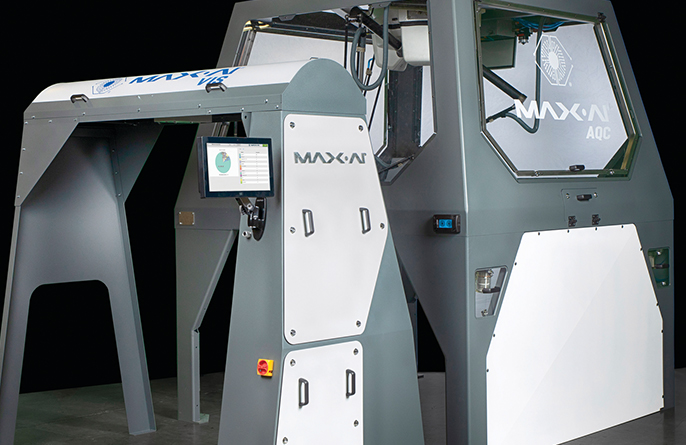Resource-efficient and environmentally sound solutions in Robotics & Discrete Automation
In ABB’s Robotics & Discrete Automation Business Area, we are enabling manufacturers to address demand driven by four megatrends: the rise of individualized consumption; digitalization; labor shortages due to aging populations; and general uncertainty, which can have significant impacts on production. To address these trends, flexibility and simplification have become increasingly important, driving our Business Area to innovate and improve our portfolio of solutions in search of even greater efficiencies.
Increasing operational efficiency
Among our comprehensive range of solutions that help manufacturers improve efficiency, the robotic order-picking installation at Heemskerk’s Rijnsburg production facility in the Netherlands provides a notable example of how advanced solutions improve sustainability. Heemskerk Fresh & Easy is one of the largest vegetable processing companies in Europe, producing 3.5 million to 4 million fresh convenience products every week. These include salads, ready-to-cook meals and pre-cut vegetables and fruit – healthy products with very short shelf lives.
Its central facility’s new robotic system was designed to prepare orders according to each food retailer’s needs, so that the products can be shipped directly to stores and supermarkets instead of making an intermediate stop at a distribution center. This reduces the amount of time that fresh food spends in the supply chain, resulting in extended shelf life and less wasted food.
The system utilizes an ABB IRB 660 four-axis robot that takes crates containing the orders for a particular market and places them on a conveyor belt. The crates then move to the order picking zone, where six IRB 6700 six-axis robots positioned on a track pick them up and place them in a location designated for that market. Two more IRB 6700 robots consolidate the orders in stable stacks. The crates are then picked up by another IRB 660 and placed on dollies to be transported directly to the supermarket. The system can seamlessly process an endless variety of orders and ensures that 75 percent of the products processed today are on store shelves the following day.
About one-third of all the food produced and packaged for human consumption is wasted every year, according to the UN’s Food and Agriculture Organization. The system at Heemskerk currently processes more than 800,000 crates every week, but can handle double or even triple that volume without modification. Its efficiency and flexibility allows Heemskerk to ramp volume quickly up or down based on demand, without added investment and with minimal waste.
Using every opportunity to reduce GHG emissions
Emissions reduction is an important area in which state-of-the-art robotics have a role to play. PixelPaint is a new process developed to improve the efficiency of robots used to paint vehicles. In conventional processes, approximately 30 percent of the paint is wasted. ABB's new pixel-painting robot paints directly on to the target surface using the printing nozzle head instead of spraying with a conventional atomizer, reducing waste to zero. PixelPaint is available as a cell using two ABB IRB 5500 robots. With no need for masking or de-masking, a customized paint job can be carried out in a single pass, reducing cycle times by around 50 percent. Emissions are reduced because less paint is required, avoiding the CO2 normally emitted during its production.
ABB’s non-overspray PixelPaint solution was recognized as a groundbreaking innovation with a “Technology” award at the SURCAR annual conference in Cannes in June 2019. SURCAR is a forum for the global car body finishing community.
Reducing waste and energy consumption
By their very nature, robotics and other factory automation solutions serve to increase efficiency and reduce waste and energy consumption. This is particularly true in the fast-evolving field of collaborative robots, or “cobots.” ABB has been at the forefront of robotics breakthroughs that allow humans to work closely and safely with machines. These systems can optimize production efficiency as well as reducing the amount of factory floor space required for a production line.
A number of solutions have been developed to ensure that our robots operate efficiently and reliably. Remote Access allows ABB technicians to deal remotely with problems that may arise in the operation of robots. Condition monitoring helps customers assess energy consumption and respond proactively. Condition monitoring also helps ABB evaluate a problem, making technicians better prepared, with the right spare parts in hand for a customer site visit. Fleet assessment is used to identify stressed robots that may require replacement.
Fostering the circular economy
Together with Stena Recycling, Combitech, Electrolux and Stora Enso, ABB is a leading member of the Circular Initiative. This collaborative, industry-wide forum for Swedish companies aims to increase the circular flow of materials throughout Swedish industry. ABB, Stena Recycling, Combitech and Electrolux have, for example, worked together on a joint trial/pilot project that aims to improve the efficiency of the recycling process for electrical products. Robotics and shared product data are used to scan waste for specific products and materials. With data provided by manufacturers, the recyclable portions can be identified and then extracted. The end result is higher-quality recycled material with less leftover waste. This pilot project is currently processing unwanted vacuum cleaners; the ultimate goal is for the technology developed to be used for the processing of all types of electronic waste. For ABB, this partnership represents an important opportunity to test new solutions where automation and robotics are key components of a larger self-learning system.
Reducing waste by refurbishing unwanted robots
Of course, robots are themselves a manufactured product, and we are committed to producing them in a more resource-efficient and environmentally friendly manner. One way to achieve this is through remanufacturing, which allows customers to sell inactive or legacy robots to ABB through our buyback service, rather than scrapping or storing them. Over the last 25 years, we have refurbished and upgraded thousands of robots, giving them a second life. Before being labeled as an ABB-certified remanufactured robot, every second-hand unit undergoes rigorous checks and is guaranteed to offer the same levels of performance, durability and safety as a new ABB robot. ABB’s network of global remanufacturing facilities includes centers in Ostrava, Czech Republic, Auburn Hills, Michigan, and Shanghai, China, as well as local remanufacturing service centers in Brazil, Mexico, Germany and Vietnam.
Lessons learned
Since ABB initiated its last sustainability reporting cycle in 2013, the Robotics & Discrete Automation Business Area has evolved to regard the sustainability of our products, services and operations as a central consideration. The quest for production efficiency has always been at the heart of what we do, but we have increasingly learned to address matters of sustainability, resource conservation, safety and circularity as a conscious and critically important field of activity. This effort is a key aspect of one of our Business Area’s most critical improvement programs, which seeks to achieve further quality improvements for the benefit of our customers. The program considers all aspects of the customer journey and aims to achieve quality in every dimension the first time we undertake any action. On this basis, we intend to enhance our overall efficiency, including in our use of resources.
In taking a conscious and comprehensive approach to sustainability, we consider not just the time savings that our portfolio can deliver to our customers, but energy savings, safety improvements and more. By considering all of the impacts of our offerings, we have lowered the total cost of ownership of our solutions and made them more attractive to our customers, while reducing their impacts on the environment.
In many cases, this comprehensive approach has called for greater cooperation and collaboration across ABB’s Business Areas and functions, as well as with external technology providers and research institutions. Advances such as stronger recycling processes could not have been achieved without taking an outward-looking, cross-disciplinary approach to our activities. By prompting us to reexamine our approach to R&D, our sustainability targets broadened our Business Area’s perspective and led to significant technological refinement of our portfolio. By thinking of ways to use new materials and processes to make our products and services more sustainable, we have also made them better – more efficient, cleaner, more reliable, more compact and more versatile.
Among the other lessons we have learned from this reporting cycle, Robotics & Discrete Automation has embraced the importance of promoting the value of a sustainable approach to our colleagues, our customers and our suppliers. By highlighting the concrete benefits of this approach, we are better able to achieve rapid technological progress and expand our Business Area’s contributions to the sustainability and value-creating potential of the industrial sector around the globe.
Finally, our Business Area has embraced the importance of strongly promoting diversity and inclusion within our ranks. Following ABB’s announcement of its ambitious new targets in this area, Robotics & Discrete Automation engaged its employees in a global brainstorming process. The point of this exercise was to identify concrete and practical solutions to advance diversity and inclusion in our workplaces and build an even better culture within our Business Area.

